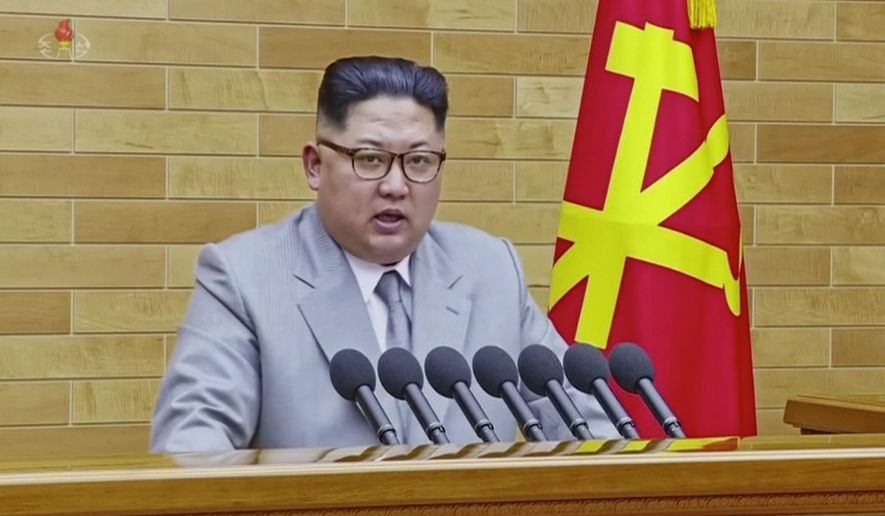The White House is weighing a proposal to create a “coalition of the willing” among international navies to interdict ships suspected of violating U.N. sanctions on supplying North Korea, according to sources close to the Trump administration.
Reports surfaces last week of an administration plan with key Asian allies that could deploy U.S. Coast Guard forces to search vessels in the Asia-Pacific. The Washington Times has learned the proposal now also is seeking China’s support for the interdictions.
Michael Pillsbury, a Mandarin-speaking Pentagon consultant who advised President Trump’s transition team, said a key element of the proposal centers on expanding the State Department’s so-called “Proliferation Security Initiative,” which Beijing “showed interest in but never signed up for” when it was created by the George W. Bush administration back in 2003.
The move comes amid a flurry of speculation over the prospect of a diplomatic dialogue between Washington and Pyongyang after South Korea’s president said over the weekend that a North Korean delegation to the just-concluded Winter Olympics in Pyeongchang, South Korea, had expressed openness to direct talks with the United States.
President Trump has responded cautiously to the overture, saying Monday any direct talks could only take place “under the right conditions.” In the past, the North Koreans have said they’d participate in talks only if the U.S. and South Korea halt all joint military exercises, while Washington has said any talks must be aimed at the total elimination of the North’s suspect nuclear programs.
While the U.S. put a pause on joint military exercises during the Olympics, which ended Sunday, the Pentagon said Monday that U.S. and South Korean military commanders are in the process of zeroing in on date for the joint drills to resume.
Regional tensions have soared over North Korea’s unexpectedly rapid progress on ballistic missile and nuclear tests during the past year, despite increasingly aggressive rhetoric from Mr. Trump. U.S. intelligence has said Pyongyang is moving closer to developing nuclear-tipped intercontinental ballistic missiles that could threaten the U.S. homeland.
Mr. Trump has vowed to use force if necessary to prevent the North Korean development of such missiles.
Seizing N. Korean cargo
Reuters first reported Friday on the Trump administration’s development of a plan to ramp up international search and seizures of vessels suspected of carrying cargo to North Korea in violations of a slew of U.N., U.S., and international sanctions.
But sources who spoke with The Times shed new light on the administration’s desire involve China, and to model the push around the 2003 Proliferation Security Initiative.
While the initiative, first championed by former State Department arms specialist and informal Trump adviser John R. Bolton, was originally designed to enhance intelligence-sharing among U.S. allies to halt trafficking weapons of mass destruction, Mr. Pillsbury, who has worked on intelligence and China policy for every U.S. administration since Richard Nixon, said the PSI could serve as a template for the current effort to cut off the North’s illicit maritime supply lines.
Now head of Chinese strategy at the Hudson Institute in Washington, Mr. Pillsbury said the initiative, whose signatories already include Australia, Japan, South Korea and Singapore, could also be dramatically enhanced if the Trump administration exploits a little-known aspect of the U.N. Charter to promote sharper enforcement of North Korea sanctions.
“There’s a concept in the charter that would set up a council of the five permanent U.N. Security Council members, a military council, that could enforce the at-sea interdiction program,” Mr. Pillsbury said. The Trump administration could throw its weight behind the idea of “a coalition of the willing” should Russia or another permanent member try to block the initiative.
“Even if the Russians try to block this, the United States can call for the establishment of the military council anyway,” he said, adding that the way the U.N. charter is written, there “is no need for a Security Council vote on this. It would be set up on the side.”
The administration, which leveled harsh new U.S. sanctions against North Korea last week but has lamented that Russia-backed vessels are skirting existing sanctions, has so far remained mum publicly on the proposal.
There are also major uncertainties over the extent to which China, North Korea’s main trading partner and strategic ally, would be willing to support a U.S.-driven interdiction push.
The plan also risks triggering a North Korean retaliation and dividing the international community. Reuters reported that China and Russia, which have previously blocked U.S. efforts to win approval for use of force in North Korea interdiction operations, are likely to oppose new actions at the U.N. if they see Washington as overstepping.
A Chinese official told Reuters that such steps should only be taken under U.N. auspices. In a statement to the news agency, China’s Foreign Ministry said it did not know anything about the U.S. plan, but that in principle Beijing believes U.N. resolutions on North Korea should be fully and thoroughly implemented.
“At the same time, we hope relevant countries act in accordance with Security Council resolutions and international law,” the statement said, without elaborating.
⦁ Carlo Munoz and Dave Boyer contributed to this article.
• Guy Taylor can be reached at gtaylor@washingtontimes.com.




Please read our comment policy before commenting.